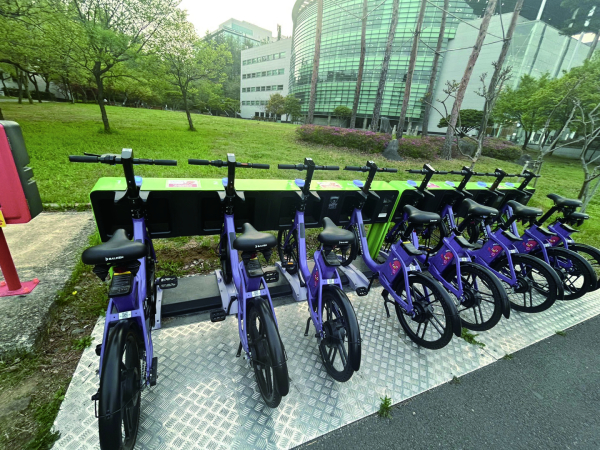
The campus E-bike, Poring, initiated a pilot operation on March 10. Previously unknown details, such as its costs and safety policies, have been unveiled as well. The pilot operation continues for six months, from March 10 to Aug. 31. The Postech Times reported on the new system of Poring, following its first article on the 184th issue during Poring’s Beta testing phase.
The name of the E-bike, which was selected from the naming contest, combines “POSTECH” and “ddiring ddiring,” a Korean onomatopoeia for a bicycle bell. Poring was launched in order to address issues on the lack of parking spaces, illegal parking, and safety issues regarding e-scooters, and to provide a sustainable smart mobility service specialized to the POSTECH campus. After its beta testing period from Dec. 16 to 22, a pilot operation is now being conducted, in which systems regarding hub operation, fare payment, rental, and return will be tested and improved, according to the Future City Open Innovation Center (FOIC). During the pilot operation, users can contribute to improving the service via feedback.
Poring operates with a mobile application called “BALKEN M.” Since Poring is exclusively available to POSTECH members, users are required to verify their school affiliation via email. There are a total of 12 hubs on campus, including the library, student union building, and some of the dormitory buildings, where users can rent and return the bike. The key difference from other Personal Mobility (PM) services is that the Poring bike must be returned to the hub it was originally located in. Although it may be inconvenient for some users, this is the key to its automated system, which operates without staff to rearrange and charge the bikes, ultimately allowing for lower fares.
Users also emphasize this system as one of its distinct features. Ahn Jong Seon (Mueunjae 24), who uses Poring once or twice a week, also highlighted this in an interview with The Postech Times. He explains that he usually uses Poring when traveling relatively long distances, such as when going to Daeyi-dong or places near Hyeongsangang River, and for grocery shopping. Users optimize the use of Poring despite the limitation of the return area, while benefiting from lower costs. Compared to other PM services available on campus, Poring is a cost-effective option. The unlocking fee costs 100 KRW per ride, and the fare is 30 KRW per minute from 9 A.M. to 6 P.M. and 5 KRW per minute from 6 P.M. to 9 A.M. One noticeable thing is that the fare is cheaper during the night, in contrast to other PM services and taxis with an additional nighttime surcharge system. This means that at night, users can ride Poring for 30 minutes at just 250 KRW, further highlighting its cost-effectiveness.
Safety policies, such as Poring Care, the insurance for any Poring users, have been well-established as well. Some of the hubs are also operating temporary shared helmet storage to reinforce safety. While the system has been successfully developed since the beta testing phase, some users are hoping that more flexibility in the return area could be implemented. Further information can be found on POVIS or the Poring website.


